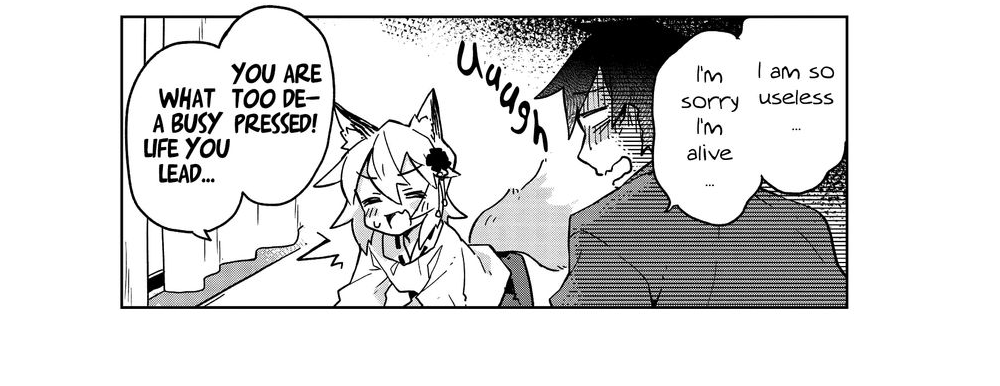-
Content Count
2639 -
Joined
-
Last visited
-
Days Won
331
Reputation Activity
-

-

-
 Gyokuyoutama reacted to Rynjin in TIAM IV: Guydiana Jones and the Kingdom of the Crystal Cockmongler
Gyokuyoutama reacted to Rynjin in TIAM IV: Guydiana Jones and the Kingdom of the Crystal Cockmongler
Same TBH. It's been bothering me for a while lol.
Especially because the show itself is basically forgotten even when way more overrated shows from the same era (*cough*Babylon 5*cough*) still get constantly praised and talked about.
-
 Gyokuyoutama got a reaction from hugthebed2 in TIAM: General Gaming edition
Gyokuyoutama got a reaction from hugthebed2 in TIAM: General Gaming edition
I haven't really gotten into most of it yet, but I thought I'd tell you about another Solitaire game because it seems pretty obscure. It's A Solitaire Mystery and it's by the Baba is You guy. As far as I'm aware it's only available on this itch.io page:
https://hempuli.itch.io/a-solitaire-mystery
Not on Steam or Gog or anything. The only reason that I know about it is that Jelly from Phase Connect did a stream where she played through the Zachtronics solitaire collection, and then she immediately played through this one too.
There's some pretty obvious inspirations from the Zachtronics games. In particular Tap Solitaire is very, very close to Cluj solitaire: sort cards into stacks but you can cheat by putting a card where it doesn't belong. In this one suits matter and they are given Baba is You flair, but it's pretty similar.
However, there a staggering 23 solitaire games in this collection and many of them are unlike anything that Zachtronics has put out. There is a bona fide Baba is You solitaire and it's everything you would hope. The suits are Baba, Keke, etc. There are also four noun cards, four "IS" cards and four attribute cards. So you can arrange BABA IS +5 which causes the value of all cards in the Baba suit to increase by 5 (looping around on the top.) Or KEKE IS ANY SUIT which allows you to use the cards in the Keke suit as if they were any suit (except for putting them up in the goal stacks.) It's easy to overlook, but you can also do things like FOFO IS BABA to make all Fofo cards count as Baba cards. Captures the spirit of the game nicely while also working as a solitaire game.
Some games are pretty close to normal solitaire versions. For example, Hanoi Solitaire basically has fewer slots but more generous stacking rules that make the game function like the Tower of Hanoi puzzle. There is a variant of the common Poker Solitaire game that people play in real life (basically you need to move cards to make poker hands to get a certain number of points.) Others are more fanciful, like Eldritch invasion where all face cards are Lovecraftian monsters that need to be defeated by totaling the correct sum, while being careful not to reveal too many monsters to get killed (yes, there is a "you died" screen.) Time Travel solitaire lets you take cards from the future, but you need to then return them back when a timer runs out lest you cause a temporal pardox. 52 solitaire basically throws all the cards in a random fashion in a box, and you are only allowed to pick up cards that aren't covered by other cards (i.e. like you start with the aftermath of 52 pickup.)
Many fit into the "fucking evil" category. For example, in chaotic solitaire your card will get swapped after you move it. Lock solitaire prevents you from moving a card for two moves after it is placed, making it very easy to walk into a corner. Binary solitaire just gives you 1's and 0's, but these need to be combined into the numbers 0-7 (i.e. 0, 1, 01, 10, 001, etc.) Wrapping your brain around how to combine cards and then swap them is a brain buster. Single card solitaire is even worse: you just have a bunch of blank cards which must be combined into groups to sort properly. I am sure there will be card games that you absolutely hate in this collection; but with 23 you'll probably find at least one that you like.
One thing I like is that each game has some comments on how easy it is to play with a real deck of cards. This is something that I did with the games in the Zachtronics collection (they are all playable with a deck of playing cards or a deck of Tarot cards except for the alcehmy game, though you have to be creative when playing Shenzan or Kabufuda.) I particularly enjoy playing Sawayama and Cribbage solitaire with a real deck of card (Cribbage solitaire is actually good practice for playing Cribbage for real.) So I appreciate having some advice on these new games. Eldritch invasion seems like it'd be the most fun, especially with a deck of cards where the face cards look appropriately menacing.
EDIT: Bonus Jelly meme:
-

-
 Gyokuyoutama got a reaction from A 1970 Corvette in Touhou Containment Thread
Gyokuyoutama got a reaction from A 1970 Corvette in Touhou Containment Thread
I think the trouble is that there are a lot of blonde characters, often of lesser importance so you forget who they are. Once you see Marisa's iconic side braid it's clear, but it's easy to miss on first watch.
But this made me realize that I haven't played the classic early Windows 2hus in half a decade. Started up EOSD, couldn't beat first stage on normal.
Though that probably had to do something with the fact that it was running at 1600FPS.
-
 Gyokuyoutama got a reaction from Raison d'être in TIAM IV: Guydiana Jones and the Kingdom of the Crystal Cockmongler
Gyokuyoutama got a reaction from Raison d'être in TIAM IV: Guydiana Jones and the Kingdom of the Crystal Cockmongler
All you need is one person to stumble on it and post a link on reddit and then it's lazy youtube content city.
Said person could even be someone who knows about SPUF but wants to see what redditors would do with it.
He could even be you. He could even be me! Well, no not really because I'm not going to make a reddit account for any reason.
Anyway, while I'm not about to conduct the experiment in reality, I do wonder what such an investigation would result in. If they had anyone with the minimal amount of competence, they would realize that you click on profile names. Then you can look at public posts, which includes everything posted on public forums before they were locked in 2019 and every single status update even since then. This is just the recent stuff at first, but you can get the full backlog with "see their activity." Thus if any investigators were minimally competent they'd be able to quickly sus out that this was a bunch of morons posting about anime and vidya and ponies and whatnot.
But there is always the possibility that someone creates an off the wall conspiracy theory that reddit hiveminds onto. In that case it doesn't matter how much actual good data people get afterwards, because the original theories are all anyone would read. In that case likely someone would eventually realize that the posts end in 2019 and suspect that something sinister is going on behind the login wall. Probably someone would claim that the status updates are being generated by LLM AI or something.
EDIT: Actually I can contribute to the mysteriousness.
-
 Gyokuyoutama got a reaction from Raison d'être in TIAM IV: Guydiana Jones and the Kingdom of the Crystal Cockmongler
Gyokuyoutama got a reaction from Raison d'être in TIAM IV: Guydiana Jones and the Kingdom of the Crystal Cockmongler
Give it a year or two and reddit or nexpo or someone is going to make a video on "5 more unexplained rabbit holes on the internet" and we'll be #4.
-
 Gyokuyoutama reacted to Raison d'être in TIAM IV: Guydiana Jones and the Kingdom of the Crystal Cockmongler
Gyokuyoutama reacted to Raison d'être in TIAM IV: Guydiana Jones and the Kingdom of the Crystal Cockmongler
I wonder how many people have stumbled across this website over the years and wondered what the hell it was, considering the front page is basically blank when you don't have an account.
-
 Gyokuyoutama got a reaction from A 1970 Corvette in In which we post the randomest shit we find on YouTube.
Gyokuyoutama got a reaction from A 1970 Corvette in In which we post the randomest shit we find on YouTube.
I watched too many of those HOMM memes and now I get slav tube recommendations
-

-
 Gyokuyoutama reacted to A 1970 Corvette in We Media Now: TF2 Edition
Gyokuyoutama reacted to A 1970 Corvette in We Media Now: TF2 Edition
i seriously don't understand spy sometimes
-

-
 Gyokuyoutama got a reaction from A 1970 Corvette in TIAM IV: Guydiana Jones and the Kingdom of the Crystal Cockmongler
Gyokuyoutama got a reaction from A 1970 Corvette in TIAM IV: Guydiana Jones and the Kingdom of the Crystal Cockmongler
The real way to prevent getting doxed as an internet celebrity.
-Make very clear at the start that you are privacy conscious and won't be giving away private information.
-"Accidentally" make offhand remarks that hint at your background, but largely do not give anything too specific away, like alluding to living in a specific state, being in certain clubs in high school, etc.
-Fans obsess over these little tidbits and eventually come up with someone they're pretty sure is you, but don't yet have the definitive smoking gun for, making them pour all of their time into getting that last confirmation.
-Jokes on them, all the personal details you talked about have nothing to do with you but instead come from some rando who overshares on facebook, and who will be definitively declared to be you when you get "doxed."
-
 Gyokuyoutama reacted to Raison d'être in TIAM IV: Guydiana Jones and the Kingdom of the Crystal Cockmongler
Gyokuyoutama reacted to Raison d'être in TIAM IV: Guydiana Jones and the Kingdom of the Crystal Cockmongler
Huh, just realized Lou Dog's lifespan was basically the entire cultural 90's - very fitting for the Sublime dog.
-

-
 Gyokuyoutama reacted to A 1970 Corvette in ITT We Appreciate Good Video Game Music
Gyokuyoutama reacted to A 1970 Corvette in ITT We Appreciate Good Video Game Music
these arisu dancing memes only further emphasized blue archive's pretty damn good OST
-
 Gyokuyoutama reacted to Razputin in I just hit 6000 hours in TF2. AMA?
Gyokuyoutama reacted to Razputin in I just hit 6000 hours in TF2. AMA?
According to Steam, I purchased the Orange Box on April 1st, 2009, meaning I played TF2 for approximately an hour every single day since then. There's definitely been times in the past where I played it waaaaaaaaaaaaaaaay too much to get to that number; nowadays I don't have time to game that often anymore and it's just my comfort game.
Anyways I thought that was a good reason to start a subspuf thread, see how y'all are doing, and maybe talk about TF2 a bit
-
 Gyokuyoutama reacted to Razputin in I just hit 6000 hours in TF2. AMA?
Gyokuyoutama reacted to Razputin in I just hit 6000 hours in TF2. AMA?
Solly just has really good secondaries, and the Buff Banner can't really keep up. The other banners, shotty and gunboats are all items I equip when I am playing 'optimally', but the buff banner always feels like I'm gimping myself. It should have some kind of passive like the other two banners.
I definitely have a bunch of controversial balance ideas, the biggest one being that I think airblast shouldn't be able to push players around at all whilst projectile reflects can stay as they are. Soldier needs a proper heel and there is a lot of interesting counterplay against a reflect happy Pyro, but getting your entire Uber stuffed, or being pushed off a cliff, or getting stuck in a corner by someone holding mouse 2 with the most generous hitbox in the game is not good gameplay.
For buffs, there's just such a massive inventory of useless items in TF2 it's kind of hard to start on it. The question is also whether you want them to be really viable or just fun to play; for example the Force a Nature can be fun to use, but if you were to try and turn it into a true sidegrade to the Scattergun, it would have to become obnoxious as hell. On the other hand you have stuff like the Sun on a Stick that just serve no purpose whatsoever.
I think the weapons most in dire need for a buff are all the Pyromania pyro unlocks, which just all either fell barely short (Dragon's Fury being able to be reflected and missing an airblast makes you killbind) or just turned out kind of garbage (all the other ones). It's depressing the second banana was actually the most truly viable unlock with TF2's last real update.
For a rework it would probably be Spy in its entirety, I really dislike how the 'meta' Spy has turned into Kunai and Dead Ringer abuse. It's quite funny how that combo can give Spy the highest effective health and movement speed in the game and still leave him the weakest class. In my opinion the big issue with Spy is that even if you get a reasonable amount of kills with him, you're still not applying as much pressure as a Soldier/Demo/Heavy shooting down a hallway. Getting kills doesn't mean much in TF2 if you're not gaining ground with it so in 12v12, an invisible spy is just a player down. If Spy was able to provide pressure like the other classes and then go invisible to try to make a play on a flank, he'd feel a lot less absent
Maybe like 20 or so, I played that kind of maps more when I played TF2 with a group of friends. I actually have some footage recorded of us having a few nostalgic games of prophunt and mario_kart from 2 years ago that I never edited because I forgot editing costs time and effort
-Brass Beast: should be more extreme, make it unable to move at all and make it deal even more damage. I also rarely play heavy
-Classic: is an awful sniper rifle which means it's still pretty dang good, being able to instagib someone from anywhere
-Thermal Thruster: it's pretty clear valve was scared of bombing pyros because they made this way too restrictive, I wish this was just better because it is quite fun.
-
 Gyokuyoutama got a reaction from Razputin in We Media Now: TF2 Edition
Gyokuyoutama got a reaction from Razputin in We Media Now: TF2 Edition
Took me forever to find this video again, so I am preserving this important bit of TF2 history:
-
 Gyokuyoutama reacted to Moby in In which we post the randomest shit we find on YouTube.
Gyokuyoutama reacted to Moby in In which we post the randomest shit we find on YouTube.
April Fool's for Granblue Versus, made by the GALO SENGEN/Bob Team Epic guys. Every frame is so dense, its a work of art.
-
 Gyokuyoutama reacted to Moby in TIAM IV: Guydiana Jones and the Kingdom of the Crystal Cockmongler
Gyokuyoutama reacted to Moby in TIAM IV: Guydiana Jones and the Kingdom of the Crystal Cockmongler
I actually found the model my parents had. Turns out it wasn't wood grain, but these red lines. It kinda looked like an Atari or Master System.
My dad used it as an alarm for years, every day the radio would start at 6AM to wake us up for school.
-
 Gyokuyoutama reacted to A 1970 Corvette in TIAM IV: Guydiana Jones and the Kingdom of the Crystal Cockmongler
Gyokuyoutama reacted to A 1970 Corvette in TIAM IV: Guydiana Jones and the Kingdom of the Crystal Cockmongler
I've never used an alarm clock in my life. I started using my DS's alarm clock feature when I needed one, and then as time has gone on I've always had some kind of device to handle alarms for me from then on.
It's an effective alarm I'd say. I use a dumb joke as my alarm now, but this would be one I'd consider if I was going to take one that is easier to explain.
I think I've seen one of those clocks at a military base's housing though.
-
 Gyokuyoutama reacted to Raison d'être in TIAM IV: Guydiana Jones and the Kingdom of the Crystal Cockmongler
Gyokuyoutama reacted to Raison d'être in TIAM IV: Guydiana Jones and the Kingdom of the Crystal Cockmongler
Mine isn't there, but my parents had 4.
These days I use both the clock and my phone alarm, just in case one fails.
-
 Gyokuyoutama got a reaction from A 1970 Corvette in TIAM IV: Guydiana Jones and the Kingdom of the Crystal Cockmongler
Gyokuyoutama got a reaction from A 1970 Corvette in TIAM IV: Guydiana Jones and the Kingdom of the Crystal Cockmongler
If you just want cheap animation/audio plays, I found that youtube actually does a good job recommending them when you are watching one provided that you watch from a clean browser. Here are some examples.
I didn't go past the first twenty seconds or so on these videos so I make no guarantees about the contents, but each of these channels seem to have plenty of videos to go through.






